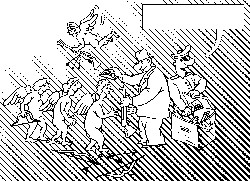Does domestic Russian politics need a new PR campaign on the language situation in Ukraine?

The Russian Foreign Ministry is again casting not the friendliest gaze at Ukraine. Interfax quotes the ministry as stressing in its statement that “certain forces in Ukraine seem to intend to create a phenomenon hitherto unheard-of in Europe: to make the language, native for the overwhelming majority (really? — Author ) of the population, a virtual outcast.” This is how the Russian state views the fact that, under a December ruling of the Constitutional Court of Ukraine, which “cut short the legal field for normal functioning of the Russian language in compliance with European standards,” Ukraine is taking administrative steps to immediately implement these “new, if the word is applicable, standards.” The statement adds that “Russia will welcome Ukraine’s efforts to develop and support the Ukrainian language, but only if this is not done by infringing on human rights or by administrative deformation of its original cultural and linguistic environment.”
Russian Federation Ombudsman Oleg Mironov has even allowed himself to condemn the actions of Ukrainian authorities, classifying limitations on the use of Russian by state officials in the line duty as “a gross and blatant violation of civilized relations between peoples and infringement on the basic rights and freedoms of citizens.”
The tone of these statements shows that Russia is deliberately trying to exacerbate the situation in such a very sensitive sphere of relations as cultural and language policy. With due account of the Kremlin’s current style of domestic politics, one would have to be naive to believe this is a question of human rights. It is quite obvious that these actions fit in with the pre-election “logic” of Russian authorities with respect to the “zones of Russian national interests”: Caucasus policy, the new concept of National Security, the new Military Doctrine of the Russian Federation, and a toughened stand on Ukraine’s oil and gas debts. What is dubious is the object of criticism, for, under the present unequal exchange of culture and information between Ukraine and Russia, the alarm about the plight of the Russian language in Ukraine looks strange, putting it mildly.
Or perhaps we should not forget that the influence of the Russian media, of Russian popular culture, and the monopoly of Russian publishers on our book market could become a leash for Ukraine, more reliable than oil and gas debts.
COMMENTARY
Vadym KARASIOV, first deputy chairman, Kharkiv branch, National Institute of Strategic Studies:
“This seems to be a new twist in the relations between Russia and Ukraine. And I must say that this decline in relations is in a way more basic than, say, the Black Sea problem, for the issue of cultural and linguistic relations is more fundamental. This action could indicate the tendency that Russian authorities take a very sensitive and not always adequate attitude toward internal political developments in Ukraine. This happens because Russia interprets such developments as steps toward the implementation of Ukraine’s European choice, which runs counter to Russia’s basic geopolitical interests.
“Finally, we should remember that Russia remains a powerful voice in terms of information and culture for Ukraine. Russian information and print products are so far more competitive than Ukrainian ones. So the domestic producer of the cultural and informational product should be protected primarily by economic instruments.”
Volodymyr YAVORIVSKY, writer, member of the Language Policy Council under the President of Ukraine:
“In the language of international law, the answer can be brief and unambiguous: this is gross interference in the internal affairs of the Ukrainian state. However, Russian diplomacy repeats these words hundreds of times a day, when reminded of the bloody massacre of its own citizens in Chechnya, and continues fierce bombardments. I do not want to speak about the wiliness and crudeness of the statement itself. It abounds in all but Suslov-type (Suslov was CPSU secretary for culture and ideology under Brezhnev —Ed. ) intonations of a metropolis censuring its own colony. It is simply a kind of terrible throwback. What happened in reality was a calm and businesslike sitting of the Language Policy Council under the President of Ukraine. We heard some stunning figures. Ukrainian- language books account for a mere 10% on the country’s book market. Ukrainian-language programs account for only 18% of what is shown on television. Ukrainian publications only make up one fourth of the newspaper realm. Thus in terms of language, Ukraine still remains sort of a subsidiary of Russia.
“We supported a very sober and wise government decision about a wider, and I stress, only wider, use of the Ukrainian language in paperwork and official communication. All this complies with the Constitution of Ukraine and legislation in force. Incidentally, let me remind you that still in force in Ukraine is the law on the Ukrainian language, adopted back in the times of the Soviet Union and voted in by the then Communist Supreme Soviet. So I think nobody’s bluster should keep us from building the Ukrainian state.”
AS THE STORY WAS GOING TO PRESS
While various Russian agencies continue to make statements about the alleged persecution of the Russian language in Ukraine, The Day’s Serhiy SOLODKY was told in the Embassy of Ukraine in Moscow that there had not yet been any reaction from the Ukrainian Ministry of Foreign Affairs (which, according to the embassy information, discussed on February 11 the Russian Foreign Ministry statement) and thus the embassy was not yet “authorized” to comment. Meanwhile, The Day’s correspondent failed to get in touch with anybody in the Ukrainian Foreign Ministry who could comment on the situation. However, the ministry’s press service informed us there had been no meetings on the day in question at which the Russian statement could have been discussed.
Newspaper output №: Section






